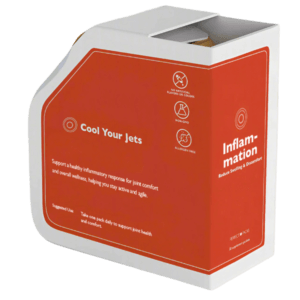
What is arthritis?
Arthritis is a common condition, with some prevalent types being osteoarthritis, rheumatoid arthritis, gout, and ankylosing spondylitis. Juvenile arthritis, a less common form, is a disease that affects children specifically. Each type of arthritis impacts the joints and can vary in severity and symptoms.
People with arthritis often experience joint-related issues such as pain, swelling, stiffness, redness, warmth, and reduced mobility. These arthritis symptoms may occur in one or multiple joints. In some cases, arthritis can also affect other parts of the body, such as the eyes, and may lead to general symptoms like fatigue.
How is arthritis usually treated?
The type of treatment recommended often depends on the specific type of arthritis, the joints affected, and the severity of the symptoms. A range of options can be used, including medications, surgical procedures, and other therapies.
Medications may include pain relievers such as Muscol, anti-inflammatory drugs such as Nurofen or Voltaren, the latest form of treatment with janus kinase inhibitors (JAKis) like Xeljanz, and disease-modifying anti-rheumatic drugs (DMARDs) such as Humira. In more severe cases, surgery might be necessary to repair or replace damaged joints.
What is the Mediterranean diet?
The Mediterranean diet is not actually a diet in the traditional sense. It does not involve strict rules or forbidden foods. Instead, it reflects the traditional eating habits of people who have lived for centuries in countries surrounding the Mediterranean Sea.
The Mediterranean diet is known for its anti-inflammatory properties, which have been shown to help reduce arthritis symptoms in individuals dealing with certain types of arthritis.
The Mediterranean diet focuses on a high intake of fruits, vegetables, whole grains, legumes, seeds, nuts, and healthy fats such as olive oil. This diet is primarily plant-based but also includes seafood, dairy, and poultry in moderation. Individuals who follow this way of eating tend to be healthier and have a lower risk of developing other chronic diseases such as obesity, type 2 diabetes, and heart disease.
How does the Mediterranean diet help with arthritis?
The Mediterranean diet emphasizes eating foods that reduce inflammation and limits the intake of pro-inflammatory items such as red meat, sugar, and most dairy products. Research has indicated that certain foods included in this diet can play a role in managing inflammation.
According to the Arthritis Foundation, following an anti-inflammatory diet has been shown to significantly improve joint pain and reduce symptoms of osteoarthritis.
What you can eat on a Mediterranean Diet for Arthritis
A Mediterranean meal focuses on a few key components. Meals are centered around fruits, vegetables, whole grains, and legumes. Fish is included a couple of times per week, and extra virgin olive oil is used as a healthier alternative to refined oils such as canola or saturated fats like butter. Fresh fruit often serves as a simple and natural dessert option. Red meat is consumed less often than fish and chicken, while sugar, processed meats, refined grains, refined oils, and other highly processed foods are generally avoided.

The Mediterranean diet can be beneficial for managing arthritis, particularly when broken down into its key components.
- Fruits and vegetables play a significant role in this diet due to their high levels of antioxidants, which support the immune system and help reduce inflammation. Brightly colored options such as strawberries, blueberries, cherries, spinach, broccoli, and kale are especially rich sources of antioxidants.
- Fish such as sardines, tuna, and other cold-water species are excellent sources of omega-3 fatty acids. These fatty acids play a key role in reducing inflammation by lowering levels of proteins like C-reactive protein and interleukin-6 that contribute to inflammatory processes in the body.
- Olive oil is rich in compounds that help reduce inflammation, including antioxidants, monounsaturated fats, and oleocanthal. Oleocanthal, a phenolic compound found in extra virgin olive oil, is particularly known for its ability to ease pain and inflammation.
- Nuts and seeds are rich in monounsaturated fats as well as other beneficial nutrients like fiber and protein. Some of the best nut sources of monounsaturated fats include pistachios, walnuts, almonds, and pine nuts.
The bottom line – is the Mediterranean diet a myth or a miracle for arthritis?
A diet rich in anti-inflammatory foods can be an effective way to help prevent or reduce inflammation. However, in many cases, such as certain types of arthritis, particularly if the symptoms are severe, dietary changes alone may not be enough, and medical intervention might be necessary. If this is the case, the Mediterranean diet could be considered a complementary eating plan along with traditional medical treatments.
Other interventions to improve quality of life with arthritis

- Eating healthy, losing extra weight, building muscle strength, and learning how to move joints safely can be helpful no matter what type of arthritis someone has or which joints are affected. Staying active, eating well, and managing weight are also important for lowering the risk of heart disease, which is connected to conditions like rheumatoid arthritis and lupus.
- Here are some simple tips and techniques anyone can use to save energy, take care of their joints, handle daily activities more easily, and adjust to changes in their routine.
- Stay active and avoid sitting in one spot for too long. For example, if someone is working at a desk, they should stand up and stretch every 15 minutes. The same goes for sitting at home while reading or watching TV, taking regular breaks to move around helps.
- People can protect their joints by using their strongest muscles. For example, instead of using fingers or wrists to push open heavy doors, they can use their arms or shoulders. On stairs, it’s helpful to step up with the stronger leg first and step down with the weaker leg to avoid putting extra stress on the hips or knees.
- Plan ahead and cut out unnecessary tasks, like choosing clothes that don’t need ironing. Keep work and storage areas tidy and place items used often within easy reach.
- Use tools and gadgets to make tasks easier. In the kitchen, electric can openers and mixers can save effort. In the bathroom, automatic toilet cleaners and spray-on mildew removers reduce the need for scrubbing. There are also products available to help avoid bending, stooping, or stretching too much.
- Home adjustments can make daily tasks safer and easier. Adding wheels to furniture helps with cleaning, while installing a grab bar above the tub can provide extra support. A non-slip mat in the tub can be used to reduce the likelihood of falls. For those with arthritis in their legs, using a stool in the tub or shower can make bathing more comfortable.
- Ask for help when needed. Staying independent helps build confidence, but trying to do everything alone can lead to problems. A good approach is to talk to family and friends about the disease and how it affects daily life. They can provide support by helping with specific tasks, making things easier to manage.
FAQs
What foods should be avoided in arthritis?
It’s best to avoid foods like processed snacks, red meat, fried foods, alcohol, and anything with added sugar. It’s also important to focus on lifestyle habits like staying active, maintaining a healthy weight, and not smoking to help manage arthritis.
Is tea good for arthritis?
Yes, tea can be good for arthritis. Green, black, and white teas all have plant compounds called polyphenols that fight inflammation. Green and white teas have the most polyphenols, making them especially good choices.
What is the best exercise for arthritis?
Aerobic exercises can boost heart and lung health, help with weight management, and increase energy levels. Some joint-friendly options include walking, biking, swimming, and water aerobics. It’s recommended to aim for 150 minutes of moderate aerobic activity each week.
What is the strongest natural anti-inflammatory?
Fatty fish like salmon, tuna, mackerel, herring, sardines, striped bass, and anchovies contain nutrients that help fight inflammation. People can get these benefits by eating fish or taking fish oil supplements.
What is the golden herb for arthritis?
Research has looked into the effects of turmeric on arthritis. In 2016, a review of studies found that taking 1,000 mg of curcumin daily could reduce pain and inflammation from osteoarthritis. It worked just as well as common anti-inflammatory drugs like ibuprofen and diclofenac.

















